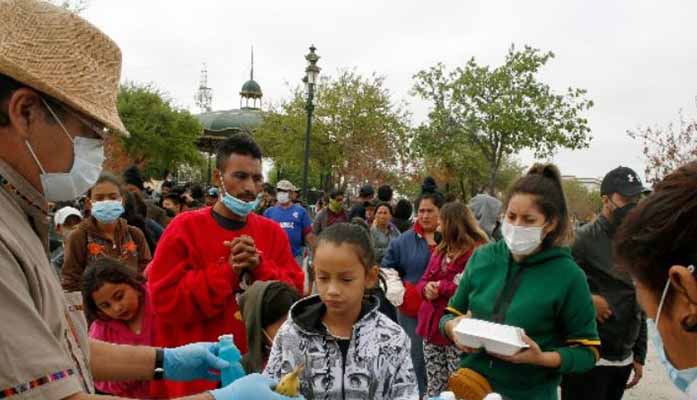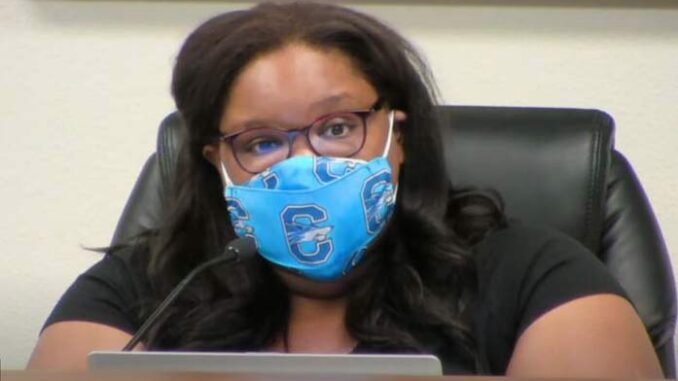
by Brian Anderson | Oct 18, 2022 | Opinion
By Brian Anderson |
“The debate debacle continues this morning,” the TV anchor said, laughing. “The never-ending story of Democratic candidate Katie Hobbs choosing not to debate her opponent, Kari Lake.”
That’s what Arizona voters heard last week as they woke up and turned on one of Phoenix’s most popular morning news programs. They’ve been hearing it for months.
Hobbs’ refusal to debate Lake, the Republican nominee, has become the defining story of the gubernatorial race, one that started out as a 20-year precedent-breaking decision and has morphed a larger-than-life narrative about the Democrat’s political judgment and skittishness, with multiple left-leaning media outlets, from MSNBC and The View to the Arizona Republic and the New York Times, all asking the same question: What in the world is she thinking?
Hobbs claims it’s because her opponent is too far to the right. In reality, her national headline-making stage fright has been going on for much longer than the general election.
It began in April when Hobbs declined to participate in a June 30th debate with her Democratic primary opponent Marco López, the former mayor of Nogales and chief of staff at U.S. Customs and Border Protection under President Barack Obama. With one exception, Hobbs was the only statewide candidate in Arizona who declined. López used light political pressure hoping to change her mind — he’d often ask the crowd: “¿Dónde está Katie?” — but, when approached by the local press in May, Hobbs’ campaign claimed that she had (conveniently) scheduled “multiple events in Tucson” on June 30th and couldn’t make the two-hour drive back to Phoenix.
López understood. So, he wrote a letter to the Citizens Clean Elections Commission, the government body that organized the debate, granting it permission to “reschedule the debate to a time and date that fits into the Secretary’s busy schedule” over the next 40-plus days. Hobbs declined to reschedule.
When June 30th arrived, a local reporter reached out to Hobbs for comment on her absence. She must have been pretty busy that day, what with “multiple events in Tucson.” But why were no photographs posted online? Oh, about those events, her campaign responded … um, they were canceled. The candidate had come down with a (convenient) case of COVID.
Three days later, Hobbs was spotted, mask-less, waving a flag at a crowded parade in Flagstaff. A superb immune system, indeed.
It wasn’t long after the general election began that Hobbs announced she would not be debating Lake, either. Instead, the Democrat demanded separate one-on-one TV interviews — but that’s not how the Clean Elections process works. Candidates who bow out are not rewarded for doing so. Hobbs insisted that Lake would create a spectacle if the debate format were not right, so the Commission held a formal meeting to appease her, during which its chairman asked her campaign manager point-blank: “Is there any scenario where Ms. Hobbs will share the stage with Ms. Lake in a debate?”
She dismissed his “hypothetical” question and refused to offer an alternate format, and the Commission ruled that the October 12th debate would go on with or without the Democrat in attendance. (Lake said that her opponent was free to change her mind at any time.)
The morning of October 12th, Hobbs joined MSNBC for a softball segment … a little too soft. Because Hobbs got a little too comfortable and accidentally blabbed to the host, as if in the middle of a private conversation, that “PBS is also giving me the same format that Kari Lake has.”
Oops. That secret arrangement wasn’t supposed to come out until after Lake’s interview that evening.
You see, Arizona PBS is the Commission’s official broadcast partner, a relationship that provides the station with unique access to high-profile debates in exchange for complying with the Commission’s rulings when candidates disagree. It turned out that Arizona PBS had struck a side-deal with the Hobbs campaign to shoot and air the one-on-one interview she’d been begging for, right as voters received their early ballots.
The Commission had no clue that the station violated its agreement — and wouldn’t have until it was too late, had Hobbs not accidentally revealed it on live TV. The Commission was forced to cancel the long-planned debate with hours to spare in order to find a new broadcast partner it could trust. In response, Lake held a press conference condemning Arizona PBS’ “backroom deal” with Hobbs, which a source informed her was made at the behest of Michael Crow, the politically connected and contentious president of Arizona State University. (ASU owns and operates Arizona PBS.)
Approached for comment the next morning, Crow denied directing the backroom deal with Hobbs but acknowledged that “he let his preference be known” to the station (which I am certain Arizona PBS interpreted in the exact way that Crow meant it). The Commission’s executive director described himself as “bewildered” by Crow’s political meddling — casting him as “the most powerful man in Arizona” other than the governor — and decried the appearance that “ASU was playing favorites with the candidates.”
Much like Crow, Mi-Ai Parrish, a managing director at ASU who helps oversee Arizona PBS, also “wouldn’t say who made the call to invite” the Democrat. Hobbs herself is similarly claiming now that “I wasn’t involved in those conversations” with ASU — which, again, is a strange series of denials coming from several people who insist they did the right thing.
A Republican state legislator has already announced plans to file a bill that will strip the state’s ties to Arizona PBS as a result of it circumventing the Clean Elections ruling. And, unfortunately for ASU, it doesn’t appear that Hobbs will be in a position to veto it.
Outside of vomiting on herself on-stage, I cannot fathom a single humiliation Hobbs could have endured in a 30-minute debate that would have been worse than the six-month headache of negative headlines her refusal has caused. Two separate polls released this month reflect that reality, finding that the Republican nominee enjoys a 3-point lead heading into Election Day, with even CNN’s Dana Bash acknowledging Monday that “the fact that [Hobbs] won’t debate has given Kari Lake a very wide opening.”
At the end of the day, Arizonans vote for who shows up — and, so far, Katie Hobbs hasn’t.
Brian Anderson is founder of the Saguaro Group, an Arizona-based political research firm.

by AZ Free Enterprise Club | Oct 17, 2022 | Opinion
By the Arizona Free Enterprise Club |
In just a few short months, Arizona will officially have the lowest flat income tax rate in the country. Governor Ducey announced last week that the Department of Revenue will be implementing the final stage of individual income tax rate and bracket reductions to a single 2.5% flat rate in 2023, a year sooner than originally planned. This is great news for Arizona taxpayers and job creators as well as the overall economic outlook of the state for years to come.
Given what is coming out of Washington, D.C. these days, this news couldn’t have come at a better time…
>>> CONTINUE READING >>>

by Dr. Thomas Patterson | Oct 14, 2022 | Opinion
By Dr. Thomas Patterson |
Pundits commonly depict the ongoing calamity at our border as the result of Biden administration incompetence. As with inflation, urban crime, and the deficit, their near-complete lack of insight and management skills is leading us over a cliff.
But this analysis itself is a major error. They know exactly what they are doing, and they are doing it well. They are executing a long-range plan that is achieving great success.
The Biden administration is doing everything it can to bring as many illegal immigrants across the border as possible, braving considerable political blow-back to achieve their goals. They believe the mostly unskilled, uneducated migrants will gravitate to the party that promises more government benefits and thus ensure Democratic dominance indefinitely.
So, they alternately claim the border is actually “closed” and admit they are concerned but don’t know what to do about it. Now, admittedly some of the Washington Dems aren’t that bright, but it’s not possible to be so stupid as to not be able to see what is happening here.
Immediately after his inauguration, Biden announced the border was open and reversed the Trump policies, “Remain in Mexico” and “Title 42,” that had limited illegal border crossings. Now, illegal immigrants face no consequences if they defy the border police and make it across the line.
Instead, they are treated humanely, fed, housed and released into America, usually with a deferred asylum hearing which most don’t attend, since few have legitimate asylum claims. Yet our VP border czar pretends not to understand why five million illegal immigrants have crossed the border on her watch or what to do about it.
But open borders advocates gave away the real game. Czar Kamala, and others, said a plan to control the border might be worked out if Republicans would only “come to the table.” However, the only way to control the border would be through “comprehensive immigration reform,” which is their euphemism for amnesty.
So, there you have it. Democrats are okay with cranking up a situation so intolerable that Republicans will be forced to grant citizenship to the millions who entered America illegally.
Not long ago, Democrats Hillary Clinton and Barack Obama called for strict border enforcement to protect the wages of low-income workers. Democratic opinion changed when the offspring of 20 million or so illegal aliens began to vote as anchor babies.
California has become a one-party state, and several other western states seem poised to follow suit (although the Democrats’ grip on Latino voters may be fading as they become Americanized).
Playing-dumb Democrats aren’t the only group that benefits from open borders. Foreign governments benefit from billions of dollars of remittances, money that immigrants send back home saved from their earnings and, often, government subsidies they receive here.
The political champions of racial grievance benefit from a large community of immigrants whose relative poverty purportedly is proof that America is nativist or racist. Thus, Latino welfare organizations, academic departments, lawyers, and political organizations are required to remedy this lack of social justice.
Employers clearly benefit from a pool of young compliant workers who work for wages and conditions unacceptable to growing numbers of Americans. Caring progressives not only get a cause to pontificate for, but nannies, gardeners, and housekeepers to make their lives easier.
Of course, illegal immigrants benefit too, although they successfully competed against a legal applicant who waited and played by the rules. But unlike legal immigrants, illegals don’t come because they love America and want to become loyal Americans.
Their illegal entrance shows their disdain for the Rule of Law. Many cheered wildly when socialists like Hugo Chavez of Venezuela promised to confiscate land and assets from “the rich” and give it to “the people,” ultimately resulting in the economic devastation they are now fleeing.
Americans are bound together as a nation not by blood or soil, but by the values and ideals which brought us freedom and prosperity. Our future depends on an immigration policy which selects for immigrants, of any color or ethnicity, who understand this and want to share with us not only the privileges, but also the responsibilities, of being an American.
Dr. Thomas Patterson, former Chairman of the Goldwater Institute, is a retired emergency physician. He served as an Arizona State senator for 10 years in the 1990s, and as Majority Leader from 93-96. He is the author of Arizona’s original charter schools bill.

by Kurt Rohrs | Oct 13, 2022 | Opinion
By Kurt Rohrs |
Several statutes that were passed by the Arizona legislature to reinforce parental rights in schools recently went into effect. The Chandler Unified School District Board (CUSD) was asked to vote on updates to their policies to conform to these state law changes.
Here are some of the new state laws that needed to be incorporated in district policies:
-
- HB 2498 – Prohibits vaccination requirements for staff in order to work
- HB 2453 – Prohibits masking requirements for staff in order to work
- HB 2371 – Prohibits vaccination requirements for students in order to attend school
- HB 2616 – Prohibits masking requirements for students in order to attend school
- HB 2439 – Provides for parent’s access to a list of school library materials and a list of materials borrowed by their children. However, this law exempts libraries that are run jointly by school and municipal entities.
- HB 2495 – Prohibits the referral of sexually explicit materials to students
- HB 2161 –Provides for parent access to records that relate to their child and gives parents the right to file suit if the fundamental rights to raise their children are usurped
- SB 1165 – Requires participation in school sports to be based on biological sex of the student and gives parents the right to file suit for injunctive relief
- HB 2632 – Raises the passing grade requirement on the required civics exam from 60% to 70%, making it similar to the citizenship exam given to naturalized citizens.
- HB 2325 – Provides for school time for remembrance of the September 11 terrorist attacks on or around that anniversary.
What happened during the board member comments section of the meeting was a stunning display of contempt for parents’ rights and for these legislative actions.
Board member Lindsay Love, who is unmarried and has no children, voted against complying with these state laws as a “conscientious objector.” This is an apparent contradiction to her oath of office to “… support the Constitution of the United States and the Constitution and Laws of the State of Arizona.” She then went on to imply that some recent student suicides are the fault of parents and that the district must somehow step in and save students from their parents’ cruel behavior. Ms. Love is not running for re-election.
Board member Lara Bruner, who is running for re-election, stated that “It is truly disheartening that some of the representatives in our legislature have decided to increase their control from the top,” seemingly oblivious to the fact that these legislative actions were made to address the concerns of parents.
Board member Joel Wirth expressed that he was “very disappointed in the legislature in its efforts to micromanage school districts and force their political beliefs on the district,” apparently dismissing parental concerns as irrelevant.
Board Member Jason Olive concurred and called the recent legislation “garbage” in evident contempt of the Arizona legislature that provides the funding for his school district.
Board President Barbara Mozdzen refrained from comment.
Whose Children Are they?
Does the CUSD Board really support parents’ rights as protected by state law?
Not one board member stepped forward to defend the stated policy that “parents ultimately direct the upbringing, education, health care and mental health of their children.” This is the long-standing policy of the State of Arizona as codified into law in A.R.S. 1-601 and A.R.S. 1-602.
It is unclear why CUSD Board members are so dismissive of parents and their concerns, and of the direction from the Arizona legislature. This appears to be the attitude of several school districts around the valley where a parent’s rights to raise their own children are routinely suppressed in violation of several statutes described in the Arizona Department of Education’s Parental Rights Handbook.
New School Board Leadership Needed
That’s why it is time for new, more responsive, leadership on school boards throughout the state. Please vote on November 8 for new school board members that truly respect parents and their rights to raise their own children.
Kurt Rohrs is a candidate for the Chandler Unified School District Governing Board. You can find out more about his campaign here.

by AZ Free Enterprise Club | Oct 7, 2022 | Opinion
By the Arizona Free Enterprise Club |
In between dodging questions about why she won’t debate Kari Lake and holding school choice funds hostage, Katie Hobbs has been making some curious campaign promises lately. And none have been more suspect than what she claims is her current position on tax hikes.
After dragging her feet on the issue, Hobbs finally made her stance known last month when she declared that she has no plans to raise taxes if elected governor. Then, like a good Democrat who promises everything under the sun, she took it one step further, claiming that she would cut taxes for 800,000 Arizona families.
But anyone who has followed Hobbs’ political career knows that this is just another outrageous lie. During her time in the state legislature, Katie Hobbs regularly opposed tax cuts for families while making it a habit to support multiple tax hikes.
>>> CONTINUE READING >>>

by Dr. Thomas Patterson | Oct 1, 2022 | Opinion
By Dr. Thomas Patterson |
Suddenly America is facing a severe structural labor shortage. We all feel it, whether we’re trying for reservations at a restaurant that has reduced hours, seeking handyman help, or just trying to get somebody to answer the dang phone.
Nurses and teachers are in short supply. Employers report at least two job openings for each job seeker. Beyond personal inconvenience, when workers produce fewer services and goods for dollars to chase, prices go up and inflation results.
You can partly blame it on COVID. Politicians shut down much of the economy, then shoved trillions of dollars in “COVID relief funds” to those forced not to work.
Unfortunately, the spigot was never fully closed, and many Americans found that sleeping in agreed with them. Europe, Canada, and Japan all rebounded while the U.S. was left with about one million fewer workers.
Adding to the problem, the youth anti-work movement continues to grow. Work is for suckers and victims. Social media outlets praise workers for quitting their jobs. Others are lionized for being “quiet quitters,” idlers who do the least work possible while still collecting a paycheck.
The inspiration for the anti-work cult traces back to the Marxist anti-capitalist movement, a long-time foe of the American work tradition. Their thesis is that capitalist employment is exploitive and therefore, not working is virtuous.
It coincidentally turns out that, for many Americans, government policy has significantly disincentivized work. And for these people, working harder is no longer the way to get ahead.
Writing in the Wall Street Journal, Phil Gramm and John Early explain how this effect is commonly underestimated because of the way income is reported by the federal government. The Census Bureau, inexplicably, does not treat most transfer payments as income.
That’s important because government transfer payments to the bottom 20% of households, income-wise, ballooned by 269% between 1967 and 2017 while the middle 20% realized only a 154% increase in their after tax income.
The results were staggering. In 2017, the bottom 20% of households had $6,941 in “income” and only 36% of working age people actually worked. However, after the transfer payments and taxes are included, as they should be, their total income was $48,806.
The second to the bottom quintile had 85% employment and an average total income of $50,492, actually less than a $2,000 difference from the lowest group. The middle quintile was 92% employed and earned $66,453, but after taxes and transfers that shrank to $61,350, merely 26% more than the bottom quintile.
But wait, there’s more. Family units are smaller in the lowest quintile than the others. Per capita, the adjusted net income was actually $33,653 in the lowest quintile, $29,497 in the next lowest, and $32,754 in the middle.
Sorry for all the numbers, but they tell an important story. For 60% of Americans, working much harder and even earning more money produced a negligible net benefit. Means-tested government programs were just as lucrative. It’s not hard to understand why the percentage of working age people in the lowest quintile who were employed fell from 68% in 1967 to 36% in 2017.
Policymakers seem to believe that incentives don’t matter, but they do. People who choose not to work and live off the labor of others earn some understandable resentment, but they’re not acting irrationally under the circumstance. The heart of the problem is their enablers in Big Government who, for their own political purposes, created this perverse system.
It’s often forgotten that in the 1990s, governments established work requirements for many means-tested benefits. “Workfare” was a generational policy success. In spite of hysterical warnings that “children would starve in the streets,” poverty rates dropped as employment increased.
Unfortunately, the advocates for workfare declared victory and moved on. But welfare bureaucrats stayed put, patiently reestablishing their vision of welfare without requirements. So now poverty is supported rather than reduced. And Arizona was among the states that quietly removed the work requirements for Medicaid and other welfare programs.
But government handouts that replace labor don’t work. They erode self-reliance, worker pride, and self-sufficiency. They threaten our shared prosperity. And most of all, they undermine American values.
Dr. Thomas Patterson, former Chairman of the Goldwater Institute, is a retired emergency physician. He served as an Arizona State senator for 10 years in the 1990s, and as Majority Leader from 93-96. He is the author of Arizona’s original charter schools bill.






